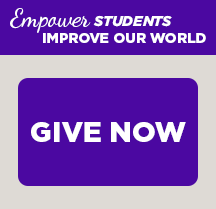Boonmee Pakviset Edwards’ work with psychology professor Rebecca Foster sparks career in helping others
By Sarah Certa ‘11
In August 2009, Boonmee Pakviset Edwards moved to the United States from Thailand with eagerness and determination to succeed. “I had no idea what I would study,” she says. “I only knew that if I wanted to get ahead in life I needed higher education.”
In 2012, Pakviset Edwards received her associate’s degree from Rochester Technical Community and Technical College, where she took an introductory psychology course and immediately knew she wanted to further pursue her education in the field. “It just clicked for me,” she said. “I understood it and wanted to learn more.”
She transferred to Winona State University (WSU) in August 2012 with her eyes set on a bachelor’s degree in psychology. Pakviset Edwards chose WSU not only because it was close to home, but also because she’d “heard many good things about WSU’s faculty and programs,” including positive experiences from friends of hers who had attended the university. For Pakviset Edwards, choosing Winona State was an easy decision and one that would yield many rewards over the next two years.
During her time in the psychology program at WSU, Pakviset Edwards’ advisor has been Dr. Rebecca Foster, a pediatric psychologist who splits her time between teaching at WSU and conducting therapy, and clinical research with patients and families at Gundersen Health System in La Crosse, Wisconsin.
In addition to being an advisee, Pakviset Edwards took several classes with Foster. It didn’t take long before Pakviset Edwards expressed interest in Foster’s work and research, which has included studies of how parents and typically developing siblings cope and adjust when one of their family members has a complex genetic disorder, such as Smith Magenis or Williams syndrome.
Pakviset Edwards began her hands-on experience by working with Foster’s data conceptualizing families’ experiences to better understand their unique challenges and needs. From the time she began her studies, Pakviset Edwards actively sought such educational opportunities that extend beyond the classroom, which is something she strongly encourages other students to do. “You just have to take the initiative,” she says. “It’s up to you to get the best out of your educational experience.”
Further, Foster compiled some of her research into a book chapter, which Pakviset Edwards and other undergraduate researchers then converted into multiple handbooks for caregivers and families. This was not the type of work done in the average undergraduate classroom.
“Boonmee and the rest of our research team have worked diligently to turn a scientific product into something very practical for parents and families,” Foster says. “This is something that can help families with the basic challenges of living with an individual with a complex genetic disorder, such as meeting academic and social needs as the individual ages.”
Pakviset Edwards says this experience sparked her passion for a career in helping others. “I realized that I love working with people, especially families and children,” she says. “I want to help them live their lives to the fullest.”
Pakviset Edwards has also aided Foster in her research at the Gundersen National Child Protection Training Center (GNCPTC), which includes studies investigating healthcare professionals’ attitudes toward being mandated abuse reporters as well as the effectiveness of intervention programs on reducing child maltreatment and promoting resilience.
Working in these “real-life” settings has reaped many benefits for Pakviset Edwards. For one, she has acquired research and leadership skills that the average classroom experience simply doesn’t provide. “Other students look to Boonmee for guidance and leadership,” Foster says. “She brings a lot of positive energy and enthusiasm to everyone around her.”
Foster says that she, too, has learned from Pakviset Edwards, and is passionate about providing opportunities for students to take their education to the next level.
“Taking undergraduate students to focus groups and other data collection efforts at Gundersen, for example, opens up a whole new world for them. They not only see how research is conducted but also have opportunities to converse with patients, families, and medical professionals from multiple subspecialties throughout the healthcare setting.”
Foster has witnessed how these experiences help students learn to work together, interact professionally in applied settings, build confidence in their skills, develop ethical practices, and realize their goals. “It helps them recognize who they are at their core, their foundation, and their passion.”
“I definitely got that,” says Pakviset Edwards. “I found my passion through research” and by working alongside colleagues in real-life settings.
Pakviset Edwards‘ experiences at Winona State have inspired her to further her education in the field. She’s proud to have been accepted into the Minnesota State University Mankato’s master’s program in social work, which she plans to start this fall. She hopes to become a licensed clinical social worker and continue working with families and children.
Pakviset Edwards says that through her collaboration with Foster and the rest of her peers and mentors in WSU’s psychology department, she has gained a support system that will extend beyond the classroom for years to come.
“I feel like I belong here,” she says. “I feel like I’m doing something worth doing, and you can’t learn that solely in the classroom.”


